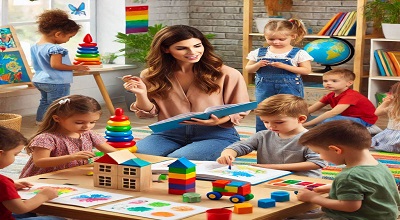The role of the teacher in EYFS
What is the role of the teacher in EYFS? In the context of the Early Years Foundation Stage (EYFS) in the United Kingdom, the role of the teacher is crucial in fostering the development and learning of young children, typically aged 0 to 5 years. The EYFS framework is designed to provide a holistic approach to education, focusing on the prime areas of learning and development: communication and language, physical development, and personal, social, and emotional development, as well as specific areas such as literacy, mathematics, understanding the world, and expressive arts and design.
The role of the teacher in EYFS includes:
Observation and Assessment:
- Teachers closely observe and assess each child’s development and learning to understand their individual needs, strengths, and areas for improvement.
- They use various assessment tools, such as observations, records, and discussions with parents, to create a holistic view of a child’s progress.
Planning and Facilitation:
- Teachers plan and provide a stimulating and inclusive learning environment that supports children’s curiosity, exploration, and creativity.
- They design activities and experiences that promote the development of key skills across all areas of learning.
Building positive relationships:
- Teachers work to establish positive and trusting relationships with both children and their families.
- They collaborate with parents and other professionals to support each child’s individual development.
Communication and Language Development:
- Teachers play a central role in fostering communication and language skills by engaging in meaningful interactions with children.
- They create an environment that encourages language development through storytelling, conversation, and other language-rich activities.
Promoting Personal, Social, and Emotional Development:
- Teachers support the emotional well-being of children and help them develop positive relationships with peers and adults.
- They provide guidance in developing self-regulation, empathy, and a sense of identity.
Differentiation and Inclusion:
- Teachers differentiate their approach to meet the diverse needs of individual children, taking into account varying abilities, interests, and learning styles.
- They create an inclusive environment that respects and values diversity.
Documentation and Reporting:
- Teachers maintain records of children’s progress and share this information with parents through regular updates and formal reports.
- They communicate effectively with parents to ensure a collaborative approach to a child’s education and development.
Final Summary
In summary, the role of the teacher in EYFS is multifaceted and involves creating a nurturing environment, facilitating learning experiences, and partnering with families to support each child’s unique journey of development and learning.
